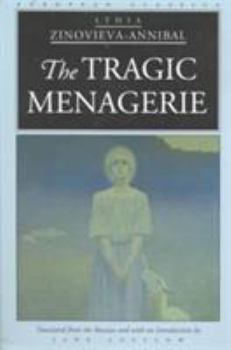The Tragic Menagerie
Though published a decade before the Bolshevik Revolution, "The Tragic Menagerie" possesses a sensibility that is modern in its descriptions of a childhood of passionate affections and unsettling... This description may be from another edition of this product.
Format:Paperback
Language:English
ISBN:0810114836
ISBN13:9780810114838
Release Date:March 1999
Publisher:Northwestern University Press
Length:185 Pages
Weight:0.55 lbs.
Dimensions:0.6" x 5.2" x 7.8"
Related Subjects
Classics Contemporary Fiction Literary Literature & Fiction Short Stories World LiteratureCustomer Reviews
2 ratings
A Russian Childhood
Published by Thriftbooks.com User , 16 years ago
Russian literature has a tradition of evoking childhood - from Tolstoy to Dostoevsky, from Herzen to Chekhov, to the lesser known Dobychin in the 20th century. This is one of those literary treasures that deserves better recognition in the West. If you have read Tolstoy's 'Childhood, Boyhood, Youth' or Dobychin's 'The Town of N', then this is a must. Lydia Zinovieva-Annibal grew up in Northern Russia. Her family was well-connected, related in a distant way to the great Russian writer, Aleksandr Pushkin (Annibal was the Abyssinian grandfather of the poet). She was a difficult child, a wild one, tormenting governesses and teachers alike. Preferring as a child and teenager, the outdoors, the forests, the countryside, her relationship to nature than that of the confines of St.Petersburg society. She married twice. Her first marriage was unhappy, the man was a parasite. In Italy, she met her future husband, the Russian symbolist poet and philosopher Vyacheslav Ivanov. Much of her earlier writing is said to be unmemorable. Many of her essays, pamphlets and other works were written with her husband's ideas in mind. The Tragic Menagerie, published in 1907, was her first and last masterpiece. She died shortly after the book was released. I was greatly reminded of Tolstoy's writing. There is such direct simplicity in the work and such emotion. The author weaves worlds of memories together, from her first impressions of her family, to living in a place half her imagination, half that of grown-up. The descriptions of the country, the various animals she encounters (the two bear cubs were my favourite) bring out the inner child, the long ago floating and flying memories of what it means to be young. There is a lot happening in these pages. Like Dobychin's 'The Town of N', the prose is spare as is the story. It is less a narrative, more a series of impressions. I would call the chapters more 'vignettes' as they give the reader a feeling instead of filling in a plot. Some readers may not like the lack of story. It is about the angst and joy of growing up without really having a focus. If you enjoy prose poetry it will be easier to read and accept the text's purpose. This is a good read but not for everyone. If you love Russian literature, it is a must.
One of the most vivid evocations of childhood I have read.
Published by Thriftbooks.com User , 24 years ago
This small masterpiece, first published in 1907, has only recently been rediscovered even in Russia. Zinovieva-Annibal writes of the natural world as vividly as D.H. Lawrence. Like him, and like Dostoevsky - though she writes with an apparently effortless simplicity - she has an equally deep understanding of the wildness that lies in our hearts. The translation is excellent - the writer's voice is convincing, and unforgettable.






